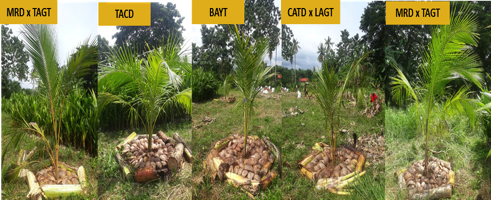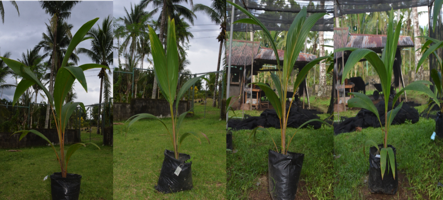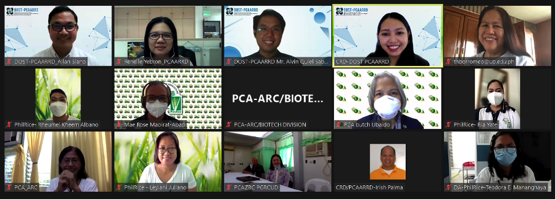 The improvement of coconut somatic embryogenesis technology (CSet) gets another year of funding support from the Philippine Council for Agriculture, Aquatic and Natural Resources Research and Development of the Department of Science and Technology (DOST-PCAARRD).
The improvement of coconut somatic embryogenesis technology (CSet) gets another year of funding support from the Philippine Council for Agriculture, Aquatic and Natural Resources Research and Development of the Department of Science and Technology (DOST-PCAARRD).
CSet is a propagation technique of coconut planting materials using plumular tissues of identified tall, dwarf, and hybrid varieties. It aims to increase the production of quality planting materials of selected coconut varieties in the country.
The projects, “Propagation of Quality Planting Materials of Baybay Tall (BAYT), Laguna Tall (LAGT), and Tacunan Dwarf (TACD) Coconut Varieties through CSet” and “Propagation of Quality Planting Materials of Selected Tall, Dwarf, and Hybrid Coconut Varieties through CSet,” are being led by Dr. Susan M. Rivera of the Philippine Coconut Authority-Zamboanga Research Center (PCA-ZRC) and Dr. Cristeta A. Cueto of the PCA-Albay Research Center (PCA-ARC), respectively.
 Both projects maintain and produce quality planting materials of selected coconut varieties, while also exploring protocol improvement to increase the regeneration efficiency of the PCA-ARC CSet protocol. Using the secondary somatic embryogenesis pathway, the number of somatic embryos and regenerants produced is expected to hasten and increase.
Both projects maintain and produce quality planting materials of selected coconut varieties, while also exploring protocol improvement to increase the regeneration efficiency of the PCA-ARC CSet protocol. Using the secondary somatic embryogenesis pathway, the number of somatic embryos and regenerants produced is expected to hasten and increase.
Likewise, modifications to the ex vitro transfer protocol are underway to increase the survival rate of both fully developed and immature plantlets. Ex vitro pertains to growing the coconut planting material outside the tissue culture or in soil or potting mixture. Several CSet-derived planting materials were already planted in the PCA-ZRC compound in Zamboanga City early this year, while those from PCA-ARC will be planted by January 2022.
 Another project of Dr. Cueto, “Gene Expression Analysis during Coconut Embryogenesis” is studying the genetic and molecular mechanisms involved in CSet. The project is currently awaiting the transcriptome sequences from South Korea of the ribonucleic acid (RNA) samples isolated from various developmental stages of somatic embryogenesis of the BAYT.
Another project of Dr. Cueto, “Gene Expression Analysis during Coconut Embryogenesis” is studying the genetic and molecular mechanisms involved in CSet. The project is currently awaiting the transcriptome sequences from South Korea of the ribonucleic acid (RNA) samples isolated from various developmental stages of somatic embryogenesis of the BAYT.
Further bioinformatics analysis will commence later on for the identification of genes associated with somatic embryogenesis, and eventually, develop gene markers for the refinement and standardization of the coconut response during in vitro culture. In vitro pertains to the process of maintaining or cultivating cells or tissue samples of living organisms in a controlled environment within a glassware or other laboratory vessel.
Dr. Maria Genaleen Q. Diaz of the University of the Philippines Los Baños (UPLB) served as S&T consultant during the review and evaluation. The meeting was conducted in preparation for the succeeding year of implementation of the said projects.
Also present in the meeting were project team members from PCA-ZRC and PCA-ARC; and DOST-PCAARRD representatives headed by Dr. Allan B. Siano, Officer in Charge of the Crops Research Division (CRD).
